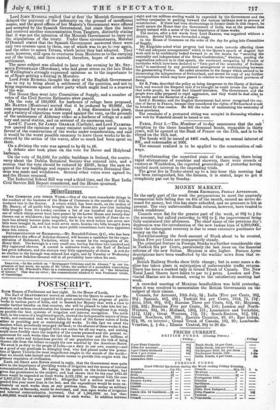POSTSCRIPT.
Born Houses of Parliament sat last night. In the House of Lords,
The Earl of Smarresultur moved an address to the Queen to assure her Ma- jesty that the House had regarded with great satisfaction the progress of public works in various parts of India, and to beseech her Majesty that with a view to confer further benefits on that country, she will be pleased to take into her im- mediate and serious consideration the means ef extending throughout it as widely as possible the best systems of irrigation and internal navigation. The noble Earl, in the course of a lengthened speech, showed the indispensable nature of these works, and contended that we had fallen far short of the former rulers of India either in providing new or maintaining old works. To this fact we owed the famines which periodically scourged the land; to the absence of these works it was owing that we were not supplied with raw cotton for all our wants, and nothing could more forcibly show the impolicy of the course pursued and the present re- quirement for such works than the tact that between four and five millions ef the most active and industrious portion of our population ran the risk of being thrown idle from the failure to supply the raw material by the American States. We owed it as duty to the people 01' India—as a duty to our own country—and as a proof of our gratitude to Almighty God, who had placed under the protec- tion of Queen Victoria the most magnificent empire in the annals of the world— that we should take instant and adequate means to provide this empire with the primary requisites of civilization. EARL DE GREY AND RIPON stated in reply, that the Government were quite alive to the importance of providing works of irrigation and the means of internal communication in India. Mr. Laing, in his speech on the Indian budget, had given due prominence to the subject, and had shown that for the year 1861-62 there would be expended on these works 3,121,129/. as compared with the sum of 2,897,6711. for the year 1860-61. Altogether half a million would be ex- pended this year more than in the last, and the expenditure would be more ex- clusively on such works than at any previous time. The outlay on military works, such as barracks, would be decreased, and that upon works of irrigation and internal communication increased. Oat of 1,500,0001. no less than 1,400,0001. would be exclusively devoted to such works. In addition between
eight and ten millions sterling would be expended by the Government and the railway companies in flushing forward the various railways now in process of construction. If there had been shortcomings in former times in this respect, he could assure the House that the Government of India was at the present time deeply imbued with a sense of the vast importance of these works. 'the motion, after a few words from Lord Hamm, was negatived without a division. Several bills were forwarded a stage. In the House of Commons on the order of the day for going into Committee of Supply,' Mr. Kingslake asked what progress had been made towards effecting those "full and adequate arrangements" which in the Queen's speech of August last were said to be confidently looked forward to as the means for "securing the neutrality and independence of the Swiss Confederation," whether, pending the negotiations referred to in that speech, the continued occupation by France of territories which have been declared to "form part of the neutrality of Switzer- land," is sanctioned by any provisional arrangement or understanding between the guaranteeing Powers. He called attention to the danger which seemed to be threatening the independence of Switzerland, and moved for copy of any further correspondence which may have passed in relation to the neutralized provinces of Savoy.
Sir R. Past, described the policy as being dangerous to the liberty of Switzer- land, and warned the Emperor that if he thought he could invade the rights of that noble people, he would find himself mistaken. The Government and the people were alike prepared to repel aggression, and they would be deaf alike to the smiles and the flatteries of a despot.
Lord J. RossELL said the English Government had never recognized the ces- sion of Savoy to France, because they considered the rights of Switzerland would be invaded by that cession. He felt the value of maintaining the neutrality of these provinces.
The remainder of a protracted sitting was occupied in discussing whether a new writ for Wakefield should be issued or not.






























 Previous page
Previous page